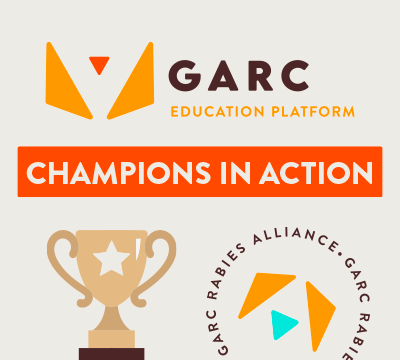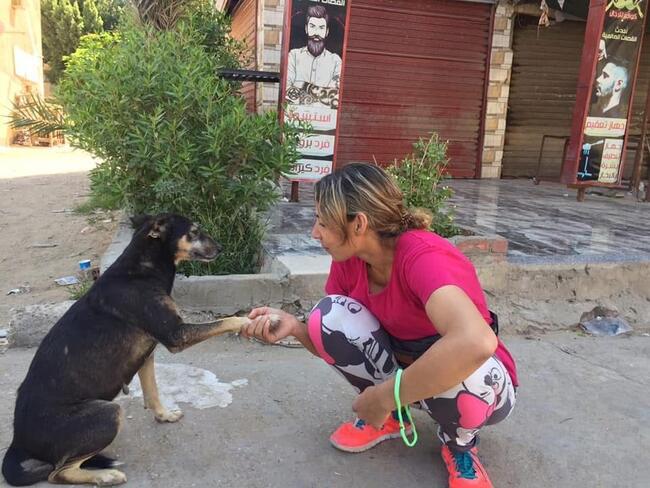New GARC, new Champions in Action

At the end of August, we shared some exciting changes with you. As part of the new GARC, we are also excited to share our Champions in Action (previously, Kerenza Chats with Champions) feature with you. In this series we highlight the inspiring work, challenges and success stories of our global rabies champions. Kerenza Vlastou, GARC’s Community Outreach Director, interviews our champions to show how their actions are helping us to eliminate rabies.
In this celebration of dedication and resilience, we are proud to introduce you to Nada from Egypt. We asked about how her own rabies journey started and some of the biggest challenges she faces in Egypt.
What inspired you to start your work in rabies prevention and dog welfare?
It all began with Nabeeh, a community dog I cared for who tragically died from rabies. He was incredibly smart and gentle. He never bit me, even after he got sick with rabies. Watching him suffer and then be killed by people who were afraid, without knowing how to help him changed my life. That day, I promised to vaccinate as many dogs as I could so no animal or person would go through that pain again.
Are you working for an animal welfare organization?
Not at all. I am an office manager in a completely unrelated field. I do all my rabies and animal welfare work entirely as a volunteer. This includes feeding, rescuing, vaccinating, aiding and long-term treatments for the animals. It is my passion, and it gives me purpose. I cover all the expenses from my own salary.
What are some of the biggest challenges you face in Egypt?
Many people see dogs as dirty or dangerous. Some even ask, “Why are you helping animals when people need help?” It is not easy to help them understand, especially as a woman working independently. But I try to explain that vaccinating dogs is a way of helping people too, it is about protecting their children, their community. I always say, “I’m helping you through the dog”.
Has GARC’s training made a difference in your work?
Absolutely. Before, people would ask, “Who are you? Why should we listen to you?” Now, with my GARC certificates, I can show them that I have the correct training. I have even printed and laminated my certificates in pocket-size to carry with me. It helps me to build trust, and more importantly, the courses gave me confidence. I can now speak up with accurate, clear information, and people listen! This helps me to be useful to my country.
Can you share one of your proudest moments as a volunteer?
There was a mother dog locked out of a shop while her puppies were trapped inside. People saw her as aggressive because she barked and tried to scratch the door open. But she was just trying to reach her babies. With a volunteer friend, we rescued the puppies and reunited them. When I handed her the puppies, she cried. I will never forget that moment. It showed me how powerful compassion and awareness can be. Dogs are families just like us.
Where does your compassion for animals come from?
It started with my grandmother. She used to feed the street animals in our neighborhood, and I would watch her with so much admiration. She passed away 12 years ago, but I carry her spirit with me every day. I even have her name, Fatheya, tattooed on my left forearm. I am left-handed, so every time I feed an animal, it feels like she is still doing it through me. Her kindness planted the seed for everything I do now.

Do you work alone, or are there others helping you in your mission?
While I often act alone in the field, I am not truly alone. I have incredible fellow volunteers like Dina Zulfikar. She helps especially with surveillance and is also a Silver Dog Health Champion. She supports and teaches me. And there are many volunteers like us across Egypt, each working in their own communities. Together, we create a network of compassion and action. We are proof that real change can come from the ground up.
How do you stay hopeful despite the challenges?
Because change is happening, even if it happens slowly. People are starting to ask questions instead of just attacking. The younger generation is more open-minded. The government is starting to vaccinate instead of cull. And every time someone joins a vaccination campaign or helps hold an icebox or a syringe, I know that we are making progress. Rabies elimination is possible if together, we keep going.
Connect with Nada on social media! You can also make a difference. Join our Communities Against Rabies today.
The Communities Against Rabies initiative is supported by Battersea Dogs and Cats Home.